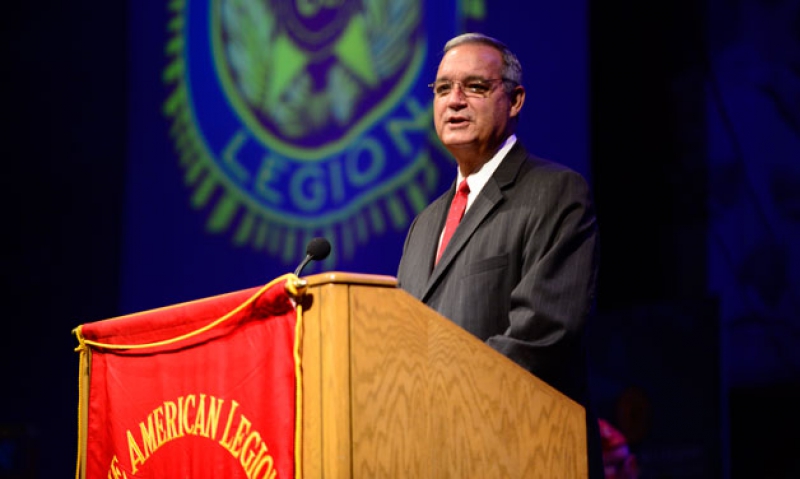
Miller: Pressure remains on VA to reduce backlog
The Department of Veterans Affairs (VA) has reduced its benefits claims backlog by 144,000 in the past five months. While that’s commendable to the chairman of the House Committee on Veterans’ Affairs, it’s not enough to relax in that endeavor.
“Some say that since VA has made progress in chipping away at the backlog, we should stop leaning so hard on the Department of Veterans Affairs in getting them to eliminate (the backlog),” Rep. Jeff Miller, R-Fla., told The American Legion National Convention Aug. 28. “The over half a million veterans that are still out there in a backlog situation would probably disagree with removing the pressure from VA.
“You can describe it 100 different ways, but it is a huge mountain that has, over time, gotten to the point where it almost looks insurmountable. So we’ve established a piece of legislation that basically puts the framework in place that uses the VA, VSOs (and) the veterans community in helping the VA to solve that backlog that exists out there. I want the VA to hit their goal of removing the backlog that exists out there by 2015. I know that is a goal that you share as well, and I certainly hope that the president shares it as well.”
Miller has called for the creation of a backlog task force that would provide recommendations for improving VA’s claims process and operations, and then continue to work with VA in reducing the backlog. He defended that strategy to the Legion.
“Some have criticized our task force by saying it’s adding an additional burden for VA to accomplish while they’re trying to reduce the backlog. But I say this – government bureaucrats under both Republican and Democrat administrations created the backlog. So it’s only natural to solicit from leaders outside the VA – those in the private sector and the VSO community to help solve this problem.
“To those that are skeptical about this approach, consider this: VA leaders have been promising to reduce the backlog since the first term of George W. Bush, and look where we are today. We are all pulling for VA to hit that goal of 2015. But I say that by establishing a backlog task force, we can find a common-sense way of making sure that they meet that goal of 2015.”
But Miller said the task force and VA will need help in ending the backlog – and that help can come from only one person.
“President Obama has got to become personally involved in ending the backlog – just as members of Congress on both sides of the aisle and many in the VSO community have implored him to do on multiple occasions,” he said. “We all know that the backlog predates the Obama administration. But that’s all the more reason we’re going to need the president’s help if we’re going to solve the problem.”
“The president did take time a short time ago to talk to veterans about the backlog... and I commend him for doing that. In listening to the president’s speech, I was struck by what he did not say. He made no reference to the oft-cited 2015 goal... even though he is the only person with the power to make sure VA lives up to its word. And the president did not pledge to ensure that VA and (the Department of Defense) work together to finally have one joint, individual health electronic record – even though there is nearly unanimous consent that such a step would help shrink the backlog. President Obama is the only person in position to hold DoD and VA leaders directly accountable, and his involvement and personal leadership is essential to solving these critical problems.”
Miller also criticized VA for what he called “an emerging pattern... of preventable deaths and lapses in care at VA medical centers across this country.” He pointed to deaths of patients at VA facilities in Pittsburgh and Atlanta, where the administrators received bonuses, and in New York where an administrator received a nearly $26,000 bonus “while overseeing chronic misuses of insulin pins that potentially exposed hundreds of veterans to blood-borne illnesses.”
“These are but a few instances of what seems to become standard operating procedure at VA: Management failures that border on the criminal, accompanied by rewards rather than consequences or accountability,” Miller said. “The vast majority of the 300,000 employees at VA are dedicated and are hard-working. They deserve better than to have the reputation of their organization dragged through the mud by a bunch of executives too busy patting themselves on the back to take responsibility.
“Both Republicans and Democrats on our committee stand united against this pattern of rewarding failure. That’s why we’ve approved legislation that would ban VA executive bonuses for five years.”
Miller also said that while VA has significantly increased its mental health budget, it hasn’t resulted in significant performance increases. He said most veterans seeking mental health care wait an average of 50 days before receiving an evaluation. “It takes courage for a veteran to stand up and ask for help,” Miller said. “They deserve more than simply to be told to stand in line.”
Miller told Legionnaires that during sequestration, veterans should not have to worry about their programs being properly funded.
“Right now, in a time when you hear about government shutdowns and you hear about things like continuing resolutions, the VA should not have to worry – nor should the veterans of this country worry – whether or not their funding will come in a timely fashion,” he said. “I think it’s critical we put 100 percent of the VA budget on a two-year cycle so when we have things like what we’re about to have when we return to Washington in about 10 days that we don’t have a (continuing resolution) that affects your funding, nor the threat of a government shutdown that would affect your funding.”
